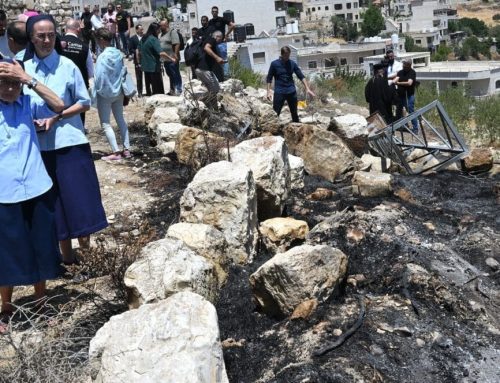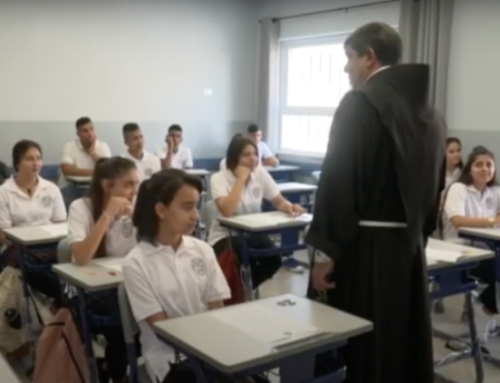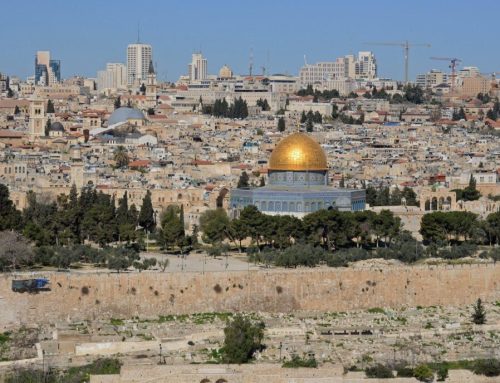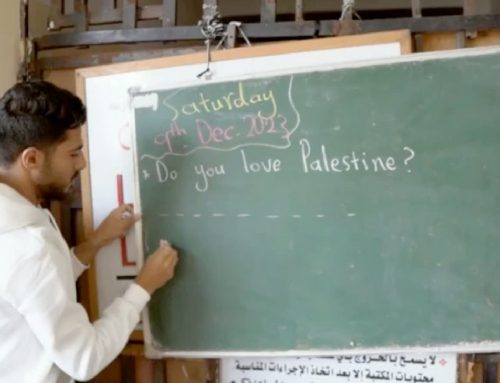Christians in the Holy Land and Middle East can aid in peace efforts in that region because of their faith in God, Cardinal-designate Donald Wuerl said Nov. 5.
 Cardinal-designate Donald Wuerl gives the
keynote address at the Nov. 5 banquet for
the Holy Land Christian Ecumenical
Foundation’s 12th International Conference.
|
“It is precisely out of the perspective that our faith provides us that we can make a positive contribution to the effort to secure both peace and human security in the Holy Land,” the cardinal-designate said in a speech to the Holy Land Christian Ecumenical Foundation.
Cardinal-designate Wuerl was the keynote speaker during the awards banquet at last weekend’s HCEF 12th Annual International Conference meeting in the Washington area. About 350 people attended the banquet.
The theme of the Nov. 5 and 6 conference and banquet was “Living the Faith: Promoting Peace and Human Security in the Holy Land.” Held at the Pope John Paul II Cultural Center in Northeast Washington and the Bethesda Marriott, the conference featured speakers, presentations and workshops to focus on the mission of the HCEF.
“Our Christian perspective helps us understand and appreciate all the more the individual acts of understanding, justice, kindness that build true and lasting peace. Our perspective is one of positive action, not simply negative reaction,” Cardinal-designate Wuerl said.
Noting the U.S.-brokered talks between Palestine and Israel that began last year, and the recently completed special Synod of Bishops for the Middle East that was held in Rome, the cardinal-designate noted that “the (HCEF) conference takes place this year at a time when there is much focus on the Holy Land and Middle East.”
The Oct. 10-24 special synod focused on challenges facing Christians living in the Middle East. During that gathering, bishops from the region noted that life is so difficult and precarious for the Holy Lady Christians that about half have left their homeland for safer destinations in the past seven years.
“Both events (the talks and the synod) testify to our enduring hope for peace and prosperity in the Holy Land and Middle East,” Cardinal-designate Wuerl said. “At the same time, they remind us how difficult it is to achieve peace in that land.”
He told conference participants that as they “reflect on peace and human security in the Holy Land,” it would be “helpful to remind ourselves of the great principles of the Church’s social teaching which serve to guide us and our actions toward others.”
Those principals, he said, include “the dignity of human person, the importance of family and community, and our call to participate in community.”
“Hopefully, these principles resonate in our hearts. They should lead us more clearly into right relationships and a recognition of the truth,” Cardinal-designate Wuerl said. “Such principles, grounded in natural law, are capable of uniting all people and, if embraced fully by all, would help lead to a lasting peace and true human security in the Holy Land.”
Noting the “years of alternating moments of violence, cessations in hostilities, talks, negotiations and various forms of discussion,” Cardinal-designate Wuerl said that “into this turmoil many innocent people are drawn, bringing suffering and a situation far from peace and human security. It is no wonder that many have a sense of grief and anxiety as they despair for peace in the Holy Land.”
He called on Christians “through ways great and small (to) build the future through our actions, especially through those works of charity and justice which seek to console and revive our fellow human beings and advance the cause of justice in the world.”
The Holy Land Christian Ecumenical Foundation works to preserve a Christian presence in the Holy Land by offering financial, spiritual and other support to Christians there. Today, Christian account for about 2 percent of the total population of the Holy Land, down from 18 percent about 60 years ago.
The HCEF operates outreach programs to foster solidarity between Western and Holy Land Christians and provides material assistance to needy Christians there.
“These projects engage human hearts, transform them and make us instruments of peace,” Cardinal-designate Wuerl said. “They foster those human relationships which open us one to another and set the stage of the peace which often eludes us, and which has been so challenging to achieve in the Holy Land.”
HCEF offers educational, health, housing and other services for children, senior citizens, individuals and families.
“These are more than good development programs; they build relationships and so often are a cause of joy and hope,” the cardinal-designate said.
During the banquet, the HCEF bestowed several awards. The Path of Peace Award, given to an individual who has championed the cause of peace in the Middle East, was presented to attorney George R. Salem, a member of the U.S. Advisory Commission on Public Diplomacy in the Arab and Muslim world.
The Living Stones Solidarity Award, to honor an institution that works to preserve a Christian presence in the Holy Land, was presented to Bethlehem University.
The HCEF President’s Award, to honor individuals who have demonstrated solidarity with the Christians of the Holy Land, was presented to Mission Help of the Sacred Heart Sister Anne Guinan and Religious Sister of Mercy Sister Caritas Kennedy. The two women religious operate a video production that produced a documentary called “Just to Live in Peace: Christians of the Holy Land.”
The Holy Land Christian Ecumenical Foundation Award, given to someone who has worked to preserve the presence of Christians in the Holy Land, was presented to Osama and Rula Kishek, board members and benefactors of the HCEF.
Cardinal-designate Wuerl said that working for peace in the Holy Land is part of the New Evangelization.
“Each of us is called to bring the age-old message of the Gospel to the world in our time and culture, including once again to the people of the Holy Land, where our faith began,” Cardinal-designate Wuerl said. “As disciples of the Lord, we are called to participate in the mission He left to the Church to share the Good News. For a Christian, peace is not attainable except in the context of God’s plan. The ability to translate into practical situations the salvific activity of Christ remains the basis of both a real peace and a truly just social order.”





